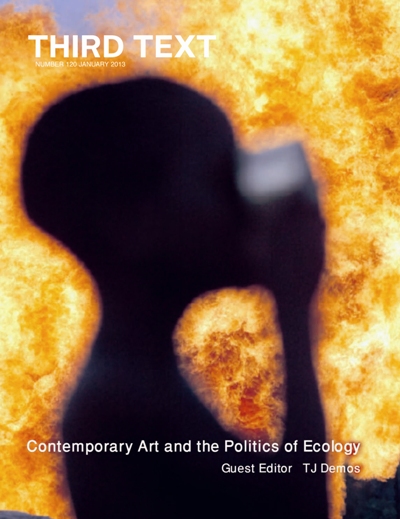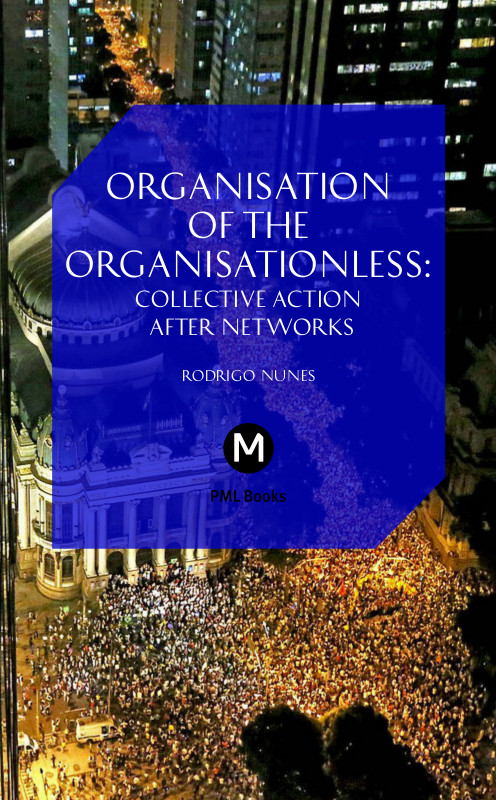Third Text, 120: Contemporary Art and the Politics of Ecology (2013)
Filed under journal | Tags: · activism, aesthetics, art, art criticism, climate crisis, contemporary art, earth, ecology, environment, oil, politics, postcolonialism, visual culture

“This special issue of Third Text investigates the intersection of art criticism, politico-ecological theory, environmental activism and postcolonial globalization. The focus is on practices and discourses of eco-aesthetics that have emerged in recent years in geopolitical areas as diverse as the Arctic, Nigeria, Bangladesh, Indonesia, Europe and Mexico. The numerous contributors address new aesthetic strategies through which current ecological emergencies – including but not limited to the multifaceted crisis of climate change – have found resonance and creative response in artistic practice and more broadly in visual culture.” (from the Introduction)
With contributions by Christoph Brunner, Roberto Nigro, Gerald Raunig, Jessica L Horton, Janet Catherine Berlo, Jimmie Durham, Subhankar Banerjee, Nabil Ahmed, Berin Golonu, Basil Sunday Nnamdi, Obari Gomba, Frank Ugiomoh, Ursula Biemann, Peter Mörtenböck, Helge Mooshammer, Patrick D Flores, Raqs Media Collective, Luke Skrebowski, Emily Apter, Steven Lam, Gabi Ngcobo, Jack Persekian, Nato Thompson, Anne Sophie Witzke, Liberate Tate, TJ Demos, Eduardo Abaroa and Minerva Cuevas.
Guest editor: TJ Demos
Publisher Third Text, London, January 2013
175 pages
PDF (10 MB)
Online supplement (contains another 6 articles + introduction)
Major Waldemar Fydrych: Lives of the Orange Men: A Biographical History of the Polish Orange Alternative Movement (2014)
Filed under book | Tags: · 1980s, activism, communism, dissent, happening, humour, poland, politics, protest, revolution, social movements

“In Communist Poland, Surrealism Paints You!!!
Between 1981 and 1989 in Wroclaw Poland, in an atmosphere in which dissent was forbidden and martial law a reality, the art-activist Orange Alternative movement developed and deployed their “socialist sur-realism” in absurd street-painting and large-scale performances comprising tens of thousands of people dressed as dwarves, in an effort to destabilize the Communist government. It worked. Beginning with the ‘dialectical painting’ of dwarves onto the patches of white paint all over the city’s walls, which uncannily marked the censorship of opposition slogans, the group moved on to both stage happenings and over-enthusiastically embrace official Soviet festivals in a way that transformed both of these into mass expressions of dissent. They illegally restaged the mass spectacle of the storming of the Winter Palace on the anniversary of the October Revolution using their own homemade tanks; organized patriotic gatherings in which anyone waving red flags or wearing red (or eating red borscht, or covering oneself in ketchup) was arrested; and inspired other Orange Alternative groups to appear across the country. Although the group existed to the left of the mainstream opposition of Solidarity, their art was a key, acknowledged factor in the overthrow of the Communist government.
Lives of the Orange Men tells the story of the movement’s main protagonists, and is the first stand-alone English-language account of the Orange Alternative, written autobiographically by is central figure, and featuring an appendix of newly translated key texts including Major’s “Manifesto of Socialist Surrealism,” a timeline of every Orange Alternative happening, and a new foreword from the Yes Men.”
Foreword by the Yes Men
Edited by Gavin Grindon
Translated by David French
Publisher Minor Compositions, 2014
Open Access
ISBN 9781570272691
328 pages
Review: Stewart Home (ArtReview, 2014).
See also other publications about the Orange Alternative
Comment (0)Rodrigo Nunes: Organisation of the Organisationless: Collective Action After Networks (2014)
Filed under book | Tags: · activism, networks, organization, social movements

“Rejecting the dichotomy of centralism and horizontalism that has deeply marked millennial politics, Rodrigo Nunes’ close analysis of network systems demonstrates how organising within contemporary social and political movements exists somewhere between – or beyond – the two. Rather than the party or chaos, the one or the multitude, he discovers a ‘bestiary’ of hybrid organisational forms and practices that render such disjunctives false. The resulting picture shows how social and technical networks can and do facilitate strategic action and fluid distributions of power at the same time. It is by developing the strategic potentials that are already immanent to networks, he argues, that contemporary solutions to the question of organisation can be developed.”
Publisher Mute, London, with Post-Media Lab, Lüneburg, 2014
PML Books series
Anti copyright
ISBN 9781906496753
53 pages
Reviews: Dave Mesing (LA Review of Books, 2014), Clemens Apprich (J Digital Cultures, 2014).
PDF, PDF (updated on 2023-11-15)
Comment (0)
